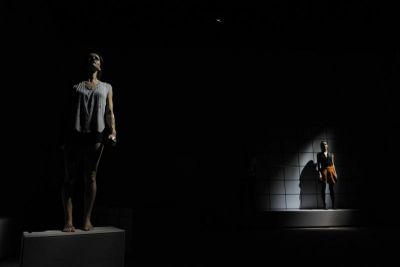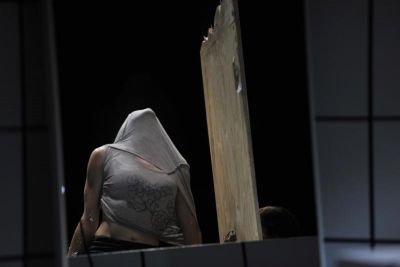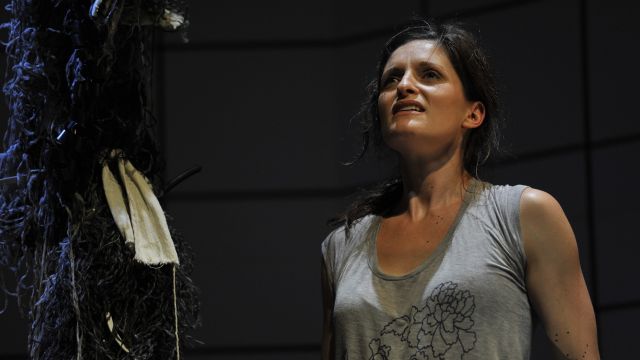Swallow
National Theatre of Parramatta’s (NToP) very first production is a dark play, but one nonetheless that ticks all the boxes of the sort of work NToP aims to produce. That is, it’s “bold, contemporary, imaginative and inspired … (taking) us into the belly of urban life”. It has attracted director Kate Champion, a team of imaginative designers and three impressive and talented performers to the ‘west’, and, hopefully, will establish this new company as another beacon for the arts in western Sydney.
Robert Love, director of Riverside Theatres: “Riverside has always wanted and needed a resident theatre company … artists in situ interpreting the local issues … working with the local community and giving the place a creative heart”. But it also needs a company that brings a range of works that will involve a range of performers and will resonate with a range of audiences, both local and national.
That being said, Swallow was a brave play with which to begin the season. It is not an easy play for the performers or the audience, zooming in as it does on “three characters pushed to the precipice of their existence through self-doubt, damage and wavering identity” (Champion). But it is a beautifully crafted play by a young Scottish playwright who manages to examine complex issues in a script that lends itself to innovation and experimentation.

Kate Champion and her creative team have done just that – resulting in a performance that is gripping in every theatrical sense.
Anna Tregloan’s set, for example, is as isolating as the characters it restrains. Two high, light grey, bricked walls and one of taut wires that stretch at intervals across the stage and flash intermittently in lighting changes, lock the three performers into an introspective triangle. Verity Hampson’s lighting is as subtly exacting as the set and almost as discordantly atmospheric as the sound designed by Max Lyandvert. All three have captured Champion’s insightful vision and the complexity of Stef Smith’s writing.
Champion has brought her broad experience across the arts to this production. It is evident that the frailties of characters have evolved through research, discussion and experimentation, guided throughout by Champion’s hallmarks of tempo, spatial tension and control. Through this, all three performers bring Smith’s troubled characters to uneasy, apprehensive life.
Valerie Berry uses her impressive experience in all aspects of performance art to the role of Sam, desperate to free the man inside her woman’s body. Strong on control in voice, expression, movement and characterisation, Berry is a perfect choice for this role. She finds all the tension and conflict in Sam – as well as his determination, compassion … and hope.
 Megan Drury is distressed and tense in the role of Rebecca. Deserted by her husband, she is distracted, fearful, unable to see a possible future, and Drury finds this in trembling edginess, agitated pacing and despondent self-doubt counter-balanced by moments of absolute, contained, stillness that suggest an inner strength, a possible will to survive.
Megan Drury is distressed and tense in the role of Rebecca. Deserted by her husband, she is distracted, fearful, unable to see a possible future, and Drury finds this in trembling edginess, agitated pacing and despondent self-doubt counter-balanced by moments of absolute, contained, stillness that suggest an inner strength, a possible will to survive.
Luisa Hastings Edge plays Anna, the most distraught of the three characters. Anna has locked herself into her small apartment, which she is destroying as effectively as she is destroying herself. Confined for the major part of the play to the square box that symbolises her personal prison, Hastings Edge evokes the anxiety that has been spawned by Anna’s fear for the world. Her movements are tightly controlled, her expressions sometimes scarily vacant, sometimes just as scarily haunting. Moments of stillness are off-set by scrabbling in her ‘box’ apartment to bring out a plethora of symbolic objects including an oil-spill-affected pelican that she strives to save.
These three disturbed but disparate characters Stef Smith and Champion bring together in intricate scenes that explore the isolation of modern living and the psychological problems that emerge from it – and yet also suggest that they can be dealt with because dealing “with this chaos … is one of the things that humanity does best.” (Smith).
In her ‘notes’ Champion says: “Swallow is a wonderful challenge for any director who relishes the opportunity to expand a play’s possibilities beyond the words on the page” and, with her cast and the imaginative work of her designers, she has created a compelling theatrical production that looks at some of the problems of contemporary society through the emotional clarity of Stef Smith’s words and characters.
It is certainly a promising beginning to NToP’s tenure at Riverside.
Carol Wimmer
Photographer: Amanda James
Subscribe to our E-Newsletter, buy our latest print edition or find a Performing Arts book at Book Nook.

